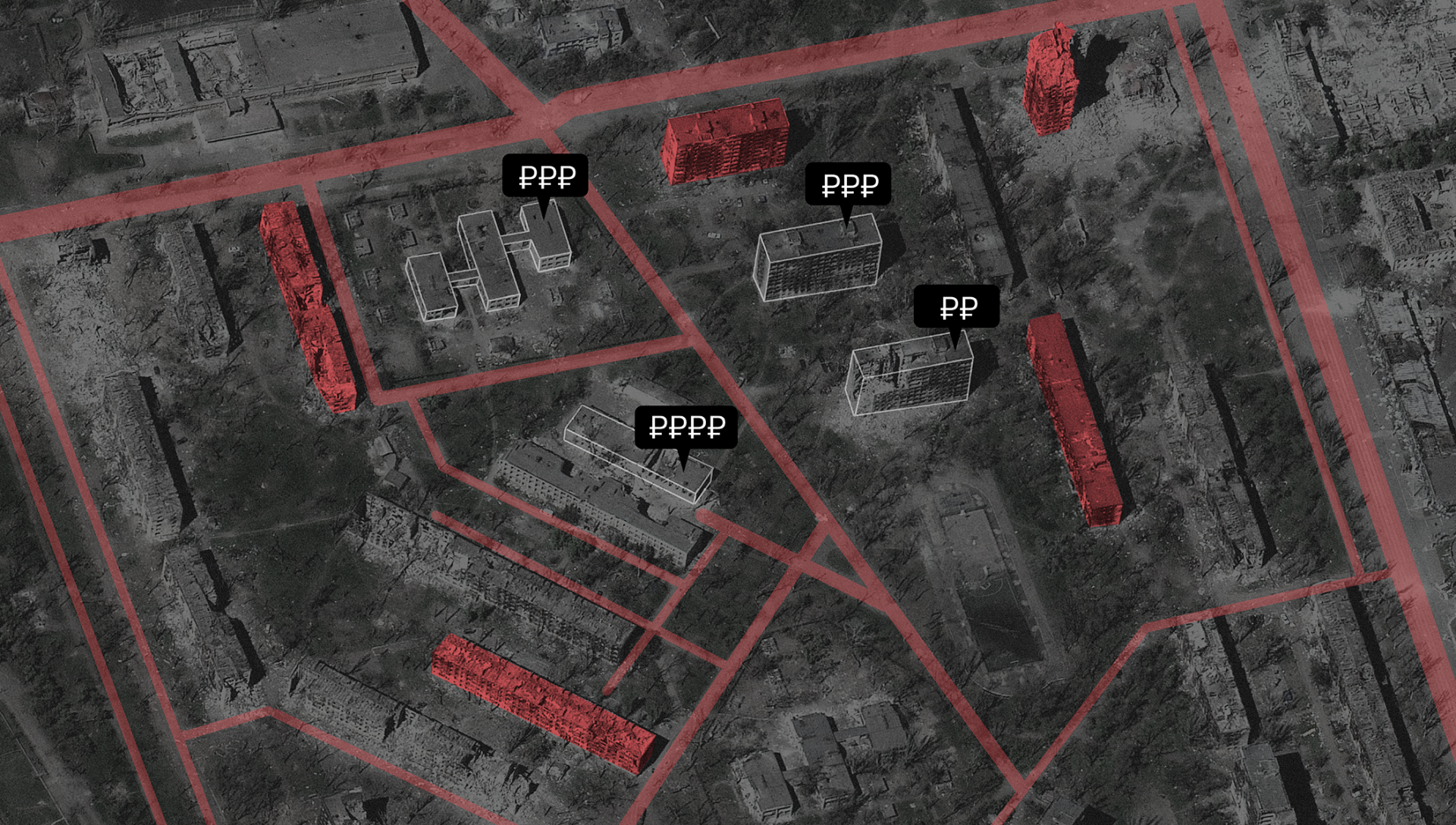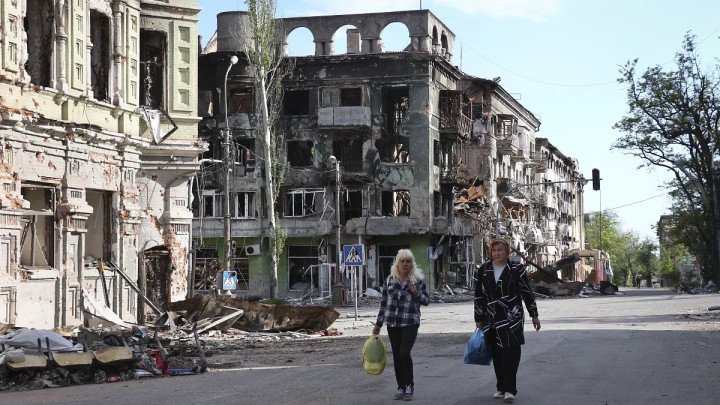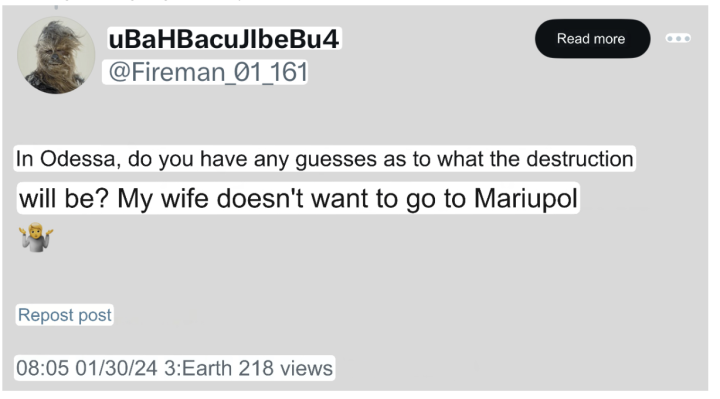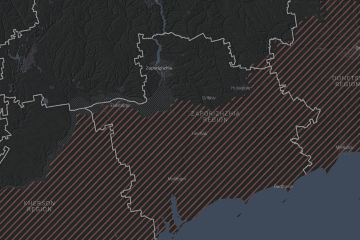- Category
- War in Ukraine
"An Unconventional Real Estate Market" or How Russia Is Seizing Ukrainian Property in Occupied Territories

Millions of Ukrainians have lost their homes due to Russian aggression. While the Russian army has physically destroyed few Ukrainian cities, Russian civilians have been able to make money on this and are actively selling other people's surviving housing in the occupied territories.
Mariupol, a Ukrainian port city in the Donetsk region, was one of the first to endure major attacks during Russia’s full-scale invasion of Ukraine in 2022. As the city was being captured, Russian forces showed no regard for the civilian population, which was desperately trying to evacuate through “green corridors”—agreements that were extremely difficult to secure with the Russians.
Long-time Mariupol resident Natalya was one of those who managed to escape.
"Taking a step into the unknown is difficult, but while staying in [Mariupol], the unknown awaited us almost every minute,” she recounted. “Every day, I learned about the death of someone I knew."
Natalya left Mariupol on March 15, 2022, the 19th day of Russia’s siege. About a week earlier, she had been sheltering in the basement of a neighboring house. When fleeing the city, she took only what she had on hand at the time, leaving behind documents and items of both sentimental and material value in her apartment.
Now, a year and a half after settling in Odesa, Natalya learned that her apartment had miraculously survived. She decided to retrieve some belongings through contacts who had stayed in the city.
Natalya arranged for a woman from Mariupol to visit her apartment and collect the items.
"When my acquaintance reached my address and began working on the lock, a man opened the door,” she said. “He demanded to know what she was doing there, and when she questioned him back, he got aggressive and chased her away, saying that he now lives there.”
After looking deeper into the matter, Natalya realized that her chances of reclaiming her apartment and belongings were nearly non-existent. Thousands of Ukrainians who left territories now occupied by Russia face similar issues.

"A profitable investment" for wealthy Russians
The battle for Mariupol ended on May 20, 2022, with the city's full occupation by Russian forces. According to the UN High Commissioner, up to 90% of apartment buildings and 60% of residential houses were destroyed during the two-and-a-half months of intense fighting and continuous Russian shelling.
Mykola Osychenko, head of the Ukrainian regional channel "Mariupol Television," estimated the death toll at around 120,000.
"In the Chornomorsk morgue, 87 thousand dead from Mariupol have been documented, and the Novoazovsk prosecutor’s office has data on another 22,500 unidentified bodies," said Osychenko.
Accurate figures are difficult to establish due to the lack of documentation. In some cases, people were buried alive under rubble, which the Russian occupation administration later removed along with the remains, or bodies were buried in yards and parks.
Tens of thousands managed to evacuate from Mariupol, leaving behind hundreds of vacant apartments. Russians took advantage of this situation, creating a new type of business.
In early 2024, the Russian propagandist project "Mirnye" (“Peaceful”) highlighted in a film the "unconventional real estate market" in which wealthy Russians saw a "profitable investment opportunity" as reconstruction efforts in the city began.
The concept involves purchasing semi-ruined properties and waiting for the buildings to be restored. The realtor interviewed in the video mentioned that this would become "an invaluable purchase" because property prices would immediately rise several times after reconstruction.
The video features a tour of a semi-ruined apartment—missing windows, gaping holes where doorways should be, and a collapsed ceiling. The former residents, caught off guard by Russian bombings, had left in a hurry, leaving all their belongings and furniture behind. The realtor noted that the new owners would decide what to do with the remaining items.
These properties are made available through the Russian occupation administration, which claims to "help those left behind and make use of unclaimed property for good purposes."
At the end of 2022, the so-called Donetsk People’s Republic (DPR) administration issued an order titled "On Approval of the Procedure for Temporary Use of Residential Premises That Show Signs of Ownerless Property Identified in the City of Mariupol."
According to the order, residential premises and other property appropriated by the city administration are provided for temporary accommodation to Mariupol residents who lost their homes due to the hostilities.
People in need must apply to the Mariupol Administration and join the queue. After that, they are supposed to sign a lease agreement. In reality, most never reach the signing stage and remain without housing, while others sell their properties.
In cases where property owners have died, municipalization occurs without obstacles. For those who fled the war and left everything behind, a separate raiding scheme has been developed.
How Russia legalizes property raids
Property raiding in Mariupol’s occupation administration is systematic. For instance, in the so-called DPR, the decree titled “On the Identification, Accounting, and Transfer to Municipal Ownership of Abandoned Immovable Property and Inherited Assets” was officially published back in the spring of 2021. At that time, it concerned other settlements occupied by Russia since 2014.
According to this decree, when the administration determines that a property is “abandoned,” some Telegram channels publish lists of such properties, including their addresses.
People who find their property on the list must contact the district administration where the apartment is located within 30 days from the date of publication. If they fail to do so, the listed properties are transferred to the ownership of the DPR administration.
The “catch” is that most people who expressed a desire to return and resolve their property issues were denied entry.
In this situation, property owners cannot take any action or even sell their property remotely. According to DPR laws, Ukrainian documents—passports, property papers, etc.—are not recognized as valid.
Since real estate registers in Mariupol have yet to be updated according to new Russian laws, cases of document fraud have become more frequent.
In such circumstances, strangers approach these confused property owners in Mariupol with a “proposal.” These individuals represent one of the most “well-paid professions” in Mariupol today—the profession of a realtor. They offer to sell the property by backdating the documents, claiming the apartment was sold before the full-scale invasion.
“Afterward, these realtors, through local officials, enter the details into new Russian databases,” noted Osychenko in an interview with Current Time, “The seller, at best, receives up to 40% of the current market value of the property, while the realtor takes most of the profit,”
“We were supposed to keep our homes, but instead they sold them and kicked us out”: stories of Mariupol residents who stayed behind
Another category of housing that has entered Mariupol’s real estate market consists of new buildings constructed on the sites of demolished ruins. These were supposed to house local residents who lost their homes but stayed in the city.
However, these people are currently forced to live on the outskirts of Mariupol, as the compensation they received only allows them to afford this kind of property. They are not provided with new housing, and mortgages are inaccessible due to the lack of employment—at best, those who find jobs receive a minimal salary of $115-$170. Moreover, many of these people cannot even apply for housing restoration because their documents were destroyed.
Meanwhile, apartments in the newly built houses, which should have been available to Mariupol residents with mortgage benefits, are being sold to wealthy Russians.
For example, at 82 Nakhimova Street, there used to be a multi-story building with a sea view. The Russians demolished it and started building a new one. Residents who remained in the city were waiting to be allocated the apartments they were entitled to. But they received nothing. Moreover, the building is not only being constructed under a mortgage but will also be registered under a new address. This means that those residents who might have a claim cannot pursue it because any lawsuit would be void since the original address no longer exists.
“The residents of the old building were thrown out, and now they’re building a house for sale,” said a woman who previously lived at 82 Nakhimova Street in an interview with Holod magazine, “We worked half our lives and lived in that apartment for over 30 years. But now, it’s all gone. I’m 63 years old and homeless.”
Who’s coming to “breathe the Mariupol breeze”?
Ildar Sharipov, director of the company “Roskapsstroy-NR,” which acts as the general contractor for the construction of new facilities, told the Russian Vedomosti publication that the housing in the new regions is being purchased by Russian builders and soldiers who want to stay “for rehabilitation, for peace, or to relax by the sea.”
“Mariupol is now a truly profitable place,” he said.
One of the Mariupol developers, “YugStroyInvest,” added that apartments in the new buildings are selling quickly because the houses have a good location by the sea.
The sea breeze of Mariupol also attracts Russians from the farthest regions of Russia, particularly from Siberia.
“There is a huge demand right now, exceeding supply,” said local realtor Tatiana Malevan from the “Territory of Business” agency in the Mirnye project propaganda film. “People are coming to us from other cities in the DPR, Luhansk, Donetsk, as well as from Siberia. Mariupol has never expanded so rapidly.”
However, not all Russians looking to relocate are rushing to Mariupol. Some have set their eyes on other Ukrainian cities and are waiting for them to be occupied.


“Any guesses on how much such a half-destroyed apartment in Odesa will cost?” one such person wrote. “My wife doesn’t want to move to Mariupol.”Moreover, the desire to change one’s place of residence has become so popular that the state uses it as a systematic approach to boost motivation for joining the Russian army.
The Russian Defense Ministry produced a propaganda video in 2023, promoting the advantages of signing a military contract. In the video, two soldiers in combat discuss where they would like to live after the war. One dreams of an apartment in one of Kyiv’s central districts, while the other dreams of a place by the sea in Odesa.
“Choose the city of your dreams,” begins the video slogan.


-29a1a43aba23f9bb779a1ac8b98d2121.jpeg)

-0666d38c3abb51dc66be9ab82b971e20.jpg)
-35249c104385ca158fb62273fbd31476.jpg)


-554f0711f15a880af68b2550a739eee4.jpg)